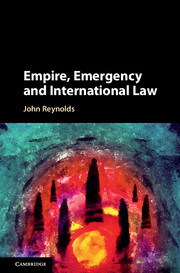(Source: Cambridge University Press)
Cambridge University Press has recently
published the book “Empire, Emergency and International Law”.
CONTENT:
What does it mean to say we live in a permanent state of emergency? What are the juridical, political and social underpinnings of that framing? Has international law played a role in producing or challenging the paradigm of normalised emergency? How should we understand the relationship between imperialism, race and emergency legal regimes? In addressing such questions, this book situates emergency doctrine in historical context. It illustrates some of the particular colonial lineages that have shaped the state of emergency, and emphasises that contemporary formations of emergency governance are often better understood not as new or exceptional, but as part of an ongoing historical constellation of racialised emergency politics. The book highlights the connections between emergency law and violence, and encourages alternative approaches to security discourse. It will appeal to scholars and students of international law, colonial history, postcolonialism and human rights, as well as policymakers and social justice advocates.
TABLE OF
CONTENTS:
Prologue pp 1-4
Part I - Traditions of the Oppressed pp 5-108
1 - Emergency, Colonialism and Third World Approaches to International Law pp 7-35
2 - Racialisation and States of Emergency pp 36-67
3 - Emergency Doctrine pp 68-108
Part II - Empire’s Law pp 109-192
4 - Emergency Derogations and the International Human Rights Project pp 111-137
5 - Kenya pp 138-169
6 - The Margin of Appreciation Doctrine pp 170-192
Part III - The Colonial Present pp 193-288
7 - Palestine pp 195-243
8 - Australia pp 244-265
9 - International Law, Resistance and ‘Real’ States of Emergency pp 266-288
Bibliography pp 289-313
Acknowledgements pp 314-316
Index pp 317-330
For more information, see the website of the publisher.


No comments:
Post a Comment
Note: Only a member of this blog may post a comment.